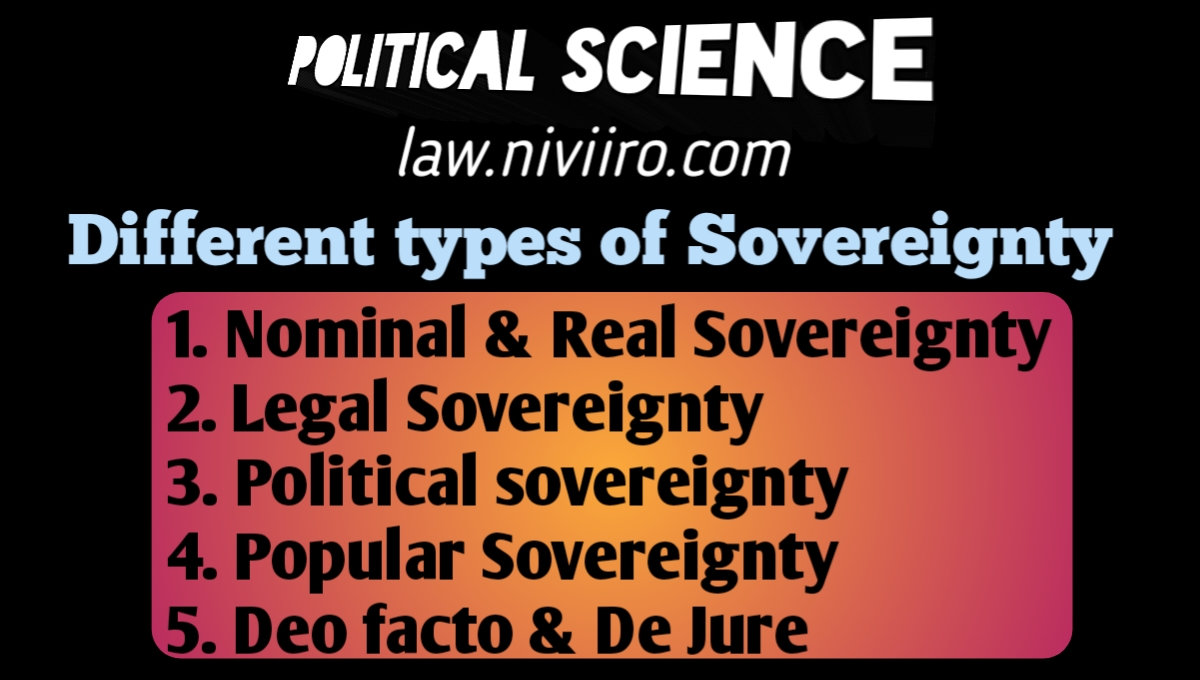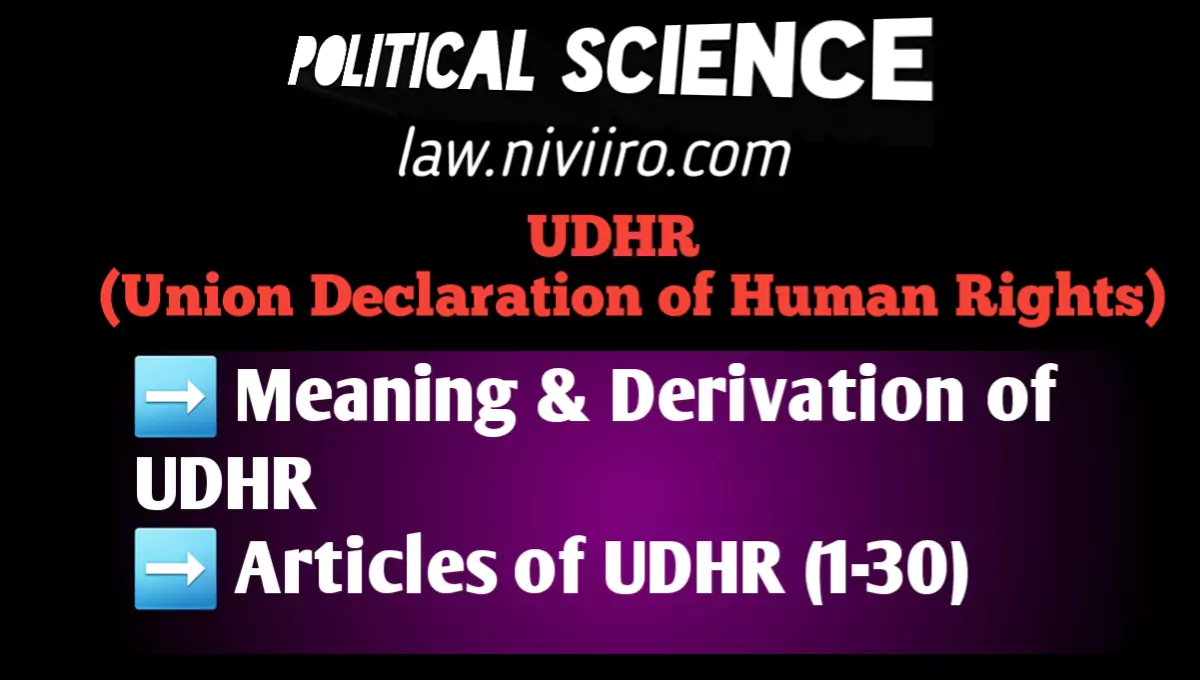The term “Sovereignty” has been derived from the Latin word “Superanus” which means supreme or paramount. Although the name “Sovereignty” is new, the concept dates back to Aristotle, who spoke of the “supreme power of the state.” Throughout the Middle Ages, Roman jurists and laymen maintained this idea in mind, frequently using the terms “Summa” potestas and “Plenitudo potestatis” to indicate the state’s supreme power.
The phrases “Sovereign” and “Sovereignty” were introduced by French jurists in the fifteenth century, and they later made their way into English, Italian, and German political literature. The term “Sovereignty” has been used in political science since the publication of Bodin’s “The Republic” in 1576. “According to J.S. Roucek and others, “the term sovereign entered the language of political theory from the feudal order, where it indicated a relationship between persons.” Any feudal overlord having authority over subjects inside his own dominions was referred to as a sovereign.”
Definitions of Sovereignty
- “That characteristic of the state by virtue of which it cannot be legally bound except by its own or limited by any power other than itself”. (Jellineck)
- “Sovereignty is the sovereign political power vested in him whose acts are not subject to any other and whose will cannot be over-ridden”. (Grotius)
- “Sovereignty is the supreme power of the State over citizens and subjects unrestrained by law”. (Bodin)
- “Sovereignty is that power which is neither temporary nor delegated, nor subject to particular rules which it cannot alter, not answerable to any other power over earth”. (Pollock)
- “Sovereignty is the supreme will of the state”. (Willoughby)
- “Sovereignty is the daily operative power of framing and giving efficacy to the laws” (Woodrow Wilson)
- Sovereignty is “the supreme, irresistible, absolute, uncontrolled authority in which the jurist summi imperi’ reside”. (Blackstone)
Kinds of Sovereignty | Different Kinds of Sovereignty
Following are the different kinds of sovereignty :
1.Nominal and Real Sovereignty, 2. Legal Sovereignty, 3. Political Sovereignty, 4. Popular Sovereignty, 5. Deo Facto and De Jure Sovereignty.
Nominal and Real Sovereignty
This contrast is common in the Parliamentary Democratic form of government. Nominal sovereignty is merely sovereignty by title. Titular sovereignty is another term for it. A nominal sovereignty is a person who serves as a symbol of state authority and exercises sovereign power solely in name. In principle, the nominal sovereign has broad powers, but in practise, these are exercised by the real sovereign. The Queen of England and the President of India are two examples of nominal sovereigns. Real Sovereignty refers to the person or group of people who genuinely wield state power. Presidents of the United States, the United Kingdom, and India, for example.
Many states had monarchies and monarchs as rulers in ancient times. They had full power, and their senates and legislatures were completely helpless. They had true sovereignty at the time. As a result, they are recognised as true sovereigns. Kings, for example, were sovereigns and hence all powerful in England before the fourteenth century, in the USSR before the eighteenth and nineteenth centuries, and in France before 1789. Following the Glorious Revolution of 1688, the status of affairs in England changed. The King is now like a rubber stamp. The British king has the authority to encourage, warn, and advise his ministers, as well as to inquire about the administration.
Except these ordinary powers, all other powers of the British king are wielded by his Ministers. Lowell put up the British Sovereign’s position in these words: “The ministers were the king’s counsellors, according to the early history of the constitution. It was up to them to counsel and him to decide. The pieces are almost reversed now. The king is consulted, but the ministers make the final decision “.
Legal Sovereignty | Different Kinds of Sovereignty
Legal sovereignty refers to the state’s legal power to issue ultimate commands. It is the state’s authority to whose orders the law of the state gives final legal effect. There are some laws that must be obeyed by the people in any independent and organised state, and there must be a power to issue and enforce these laws. Legal sovereignty refers to the power that has the legal authority to issue and enforce these laws. In England, the King-in-Parliament is sovereign.
“The British Parliament is so almighty legally speaking…. that it may adjudge an infant of full age, it can attain a man of treason after death, it can legitimise an illegitimate child, or it can make a man a judge in his own case,” Dicey writes. The legal sovereign’s authority is absolute, and law is just the sovereign’s will. Because the sovereign’s authority is unrestricted, he has the legal right to do whatever he wants. Because it is the legal sovereign who grants and enforces all of the rights enjoyed by citizens, there can be no right against him.
As a result, the legal sovereign is always definite. Only the legal sovereign has the power to announce the state’s will in legal words. The sovereign’s authority is total and paramount. This authority might be vested in the king or an absolute monarchy, or it can be vested in a group of people.
Political Sovereignty | Different Kinds of Sovereignty
“Behind the sovereign that the lawyer recognises, there is another sovereign to whom the legal sovereign must bow,” Dicey believes. The political sovereign is the sovereign to whom the legal sovereign must bow. Every ordered state requires the legal sovereign to pay close attention to the political sovereign. According to Professor Gilchrist, “The political sovereign means the sum-total of influences in a State which lie behind the law. It is roughly defined as “people’s power” under modern representative governance.
In other words, in representative democracies, political sovereign refers to the entire population, electorate, or public opinion. At the same time, it cannot be argued categorically that political sovereignty is inextricably linked to the entire population, electorate, or public opinion. Political sovereignty is a nebulous and imprecise concept. Political sovereignty is held by the class of people whose influence the majority of the people is or are. Political sovereignty is vested in the voter, public opinion, and all other elements in the state that impact and shape public opinion.
According to Professor R.N. Gilchrist, “Political sovereign presents itself through voting, the press, speeches, and a variety of other methods that are difficult to define or describe. It is, however, disorganised, and it can only become successful after it is structured. However, the organisation of political sovereignty leads to the organisation of legal sovereignty. The two are aspects of the state’s single sovereignty “. In truth, legal and political sovereignty are two elements of the state’s one sovereignty. However, both aspects are diametrically opposed. In legal terminology, a legal sovereign is a law-making authority, whereas political sovereignty resides behind the legal sovereign.
Popular Sovereignty | Different Kinds of Sovereignty
In general, popular sovereignty refers to the power of the masses as opposed to the power of the particular ruler of the class. It involves manhood, suffrage, with each individual having only one vote, and legislative control by people’s representatives. The public is seen as superior in popular sovereignty. Many writers on political science embraced popular sovereignty as a tool to counter monarchial absolutism.
According to Dr. Garner, “Sovereignty of the people, therefore, can mean nothing more than the power of the majority of the electorate, in a country where a system of approximate universal suffrage prevails, acting through legally established channels to express their will and make it prevail”.
Deo Facto and De Jure Sovereignty | Different Kinds of Sovereignty
A contrast is sometimes noted between De and De Jure (legal) sovereignty. A de jure sovereign is a legal sovereign, whereas a de facto sovereign is one who is obeyed. In the words of Lord Bryce, de facto sovereign “is the person or a body of persons who can make his or their will triumph whether with the law or against the law; he or they, is the de facto ruler, the one to whom obedience is actually given”. As a result, it is pretty evident that de jure is legal sovereignty based on law, whereas de facto is actual sovereignty.
The de facto sovereign is the individual or group of people who actually wield power. The de facto sovereign may or may not be a legal sovereign; he may be a usurping king, a dictator, a priest, or a prophet; in either case, sovereignty is based on physical or spiritual influence rather than legal right. There are numerous examples of de facto sovereignties throughout history. For example, after dismissing the Long Parliament, Oliver Cromwell became de facto ruler. After overthrowing the Directory, Napoleon became the de facto sovereign. Similarly, after deposing Spain’s legal sovereign, Franco became the de facto ruler.
Related Post
Kinds of Sovereignty ?
Following are the different kinds of sovereignty :
1.Nominal and Real Sovereignty, 2. Legal Sovereignty, 3. Political Sovereignty, 4. Popular Sovereignty, 5. Deo Facto and De Jure Sovereignty
What do you mean by Nominal Sovereignty ?
A nominal sovereignty is a person who serves as a symbol of state authority and exercises sovereign power solely in name. In principle, the nominal sovereign has broad powers, but in practise, these are exercised by the real sovereign. The Queen of England and the President of India are two examples of nominal sovereigns.
What do you mean by Real Sovereignty ?
Real Sovereignty refers to the person or group of people who genuinely wield state power. Presidents of the United States, the United Kingdom, and India, for example.
Meaning of Legal Sovereignty ?
Legal sovereignty refers to the state’s legal power to issue ultimate commands. It is the state’s authority to whose orders the law of the state gives final legal effect.
Meaning of Political Sovereignty ?
The political sovereign is the sovereign to whom the legal sovereign must bow.
Popular Sovereignty means ?
In general, popular sovereignty refers to the power of the masses as opposed to the power of the particular ruler of the class.
Distinction between Deo Facto and De Jure Sovereignty ?
A contrast is sometimes noted between De and De Jure (legal) sovereignty. A de jure sovereign is a legal sovereign, whereas a de facto sovereign is one who is obeyed. In the words of Lord Bryce, de facto sovereign “is the person or a body of persons who can make his or their will triumph whether with the law or against the law; he or they, is the de facto ruler, the one to whom obedience is actually given”. As a result, it is pretty evident that de jure is legal sovereignty based on law, whereas de facto is actual sovereignty.
References
- R.C. Agarwal, Political Theory
- M.P. Jain, Political Theory liberal and Marxiam
- Prof. H.C. Verma, Modern Political Theory
- Prof. S.L. Verma, Modern Political Theory
- V.D. Mahajan, Political Theory
- J.C. Johari, Political Science

















